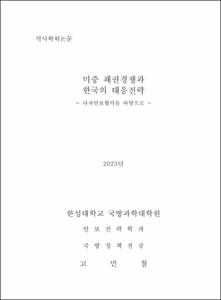미중 패권경쟁과 한국의 대응전략
= U.S.-China hegemonic competition and Korea's response strategy : Based on multilateral security cooperation
- Type
- Thesis
- Alternative Title
- 다자안보협력을 바탕으로
- Advisor
- 고시성
- Department
- 국방과학대학원 안보전략학과
- Issued Date
- 2023
- Publisher
- 한성대학교 국방과학대학원
- Keyword
- 미국과 중국의 패권경쟁; 다자안보협력체제; 한국의 대응전략
- Files in This Item:
-
-
Download
 200000654267.pdf
기타 데이터 / 743.8 kB / Adobe PDF
200000654267.pdf
기타 데이터 / 743.8 kB / Adobe PDF
-
Items in Repository are protected by copyright, with all rights reserved, unless otherwise indicated.